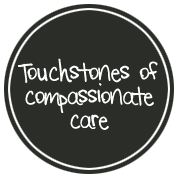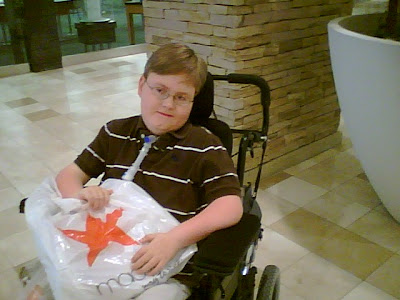No child is perfectly whole in mind, body, spirit, ability ... nor can any child meet all of a parent's expectations. Yet, there is a wholeness of each and every child that is unique and brings with it a unique set of possibilities and limitations, a unique set of opportunities for fulfillment.
Fred Rogers, Mister Rogers' Neighborhood
************************************
“Must be nice to be perfect." If I heard this once, I heard it a hundred times growing up. Apparently, I thought highly of myself and I didn’t hesitate to profess to the rest of my family that my way was the right way ... the only way ... the perfect way! I am told that as early as first grade I was re-doing my class work because it had to be perfect. A speck of crayon outside the lines was simply not acceptable. While I don’t claim to be perfect, I do confess that I am a perfectionist.
A friend of mine tells me that nothing in life happens by chance; that each of our lives is a carefully orchestrated series of events designed to teach us specific lessons catered to our individual weaknesses and flaws. Any guess as to which flaw of mine precipitated the events of my life?
Sixteen and a half years ago, I anxiously awaited the birth of my first child, anticipating nothing less than a healthy and perfect little girl. Hilary was born without complication and our first year was uneventful. Hilary was an easy baby – almost too easy. At thirteen months of age, Hilary was diagnosed with a profound hearing loss – Hilary is deaf. I was devastated, but took some comfort in the fact that she was a beautiful and bright child and, at least to the rest of the world, she looked perfect. We learned sign language and Hilary picked it up quickly. Yet, it wasn’t good enough for me. I wanted her to talk. I wanted her to be like everyone else. I wanted her to be perfect. Because Hilary received no benefit from hearing aids, the decision was made to give Hilary a cochlear implant when she was four and a half years old. After being implanted, it became clear that the services Hilary needed to maximize the benefit of the implant were not in Arizona. I did my research, talked to several other parents of children who had cochlear implants and decided that if Hilary was to ever learn to talk, she needed to attend one of the best oral schools for the deaf in the country – the Central Institute for the Deaf located in St. Louis, Missouri. Without hesitation, we put our house on the market, left our family, friends and jobs behind and moved to St. Louis. For the next three years, I was consumed with Hilary learning to hear with her implant and speak with her voice. I was the parent of a deaf child who attended an elite school for the deaf. I was surrounded by other parents who had also relocated from all over the country and who shared my same concerns, worries and passion to have their child talk one day. None of us could imagine a worse fate in life than having a deaf child.
Apparently, there was more I needed to learn.
My world and my focus came to an abrupt halt on November 4, 1998, when John Michael (“Jack”) came storming into this world seven weeks ahead of schedule. Jack had a bumpy start, but came home after six weeks on oxygen only. I breathed a huge sigh of relief, thinking we had dodged any major complications from his premature birth. Jack’s stay at home was short-lived. He bounced between the hospital and home for two months before his final stay that lasted three months. I distinctly remember during Jack’s first PICU stay, standing in the hallway looking at a bulletin board with pictures of PICU graduates and the one thing that caught my attention was that there was a lot of kids on that board with trachs. One day, Jack’s cardiothoracic surgeon came walking by and I made the comment to him that seeing all the kids with trachs on their bulletin board didn’t give me a warm fuzzy feeling. He told me he didn’t think I had anything to worry about. (Ha!) During those many months Jack was in the PICU, I prayed like I have never prayed before and my only request was … please, no trach. I didn’t have any experience with trachs, but I knew enough to know that my definition of perfect did not include a child with a hole in his neck. Not only did Jack come home with a hole in his neck, he came home with a hole in his stomach and a whole lot of equipment that I wanted nothing to do with. My mission from the minute Jack came home was to get rid of it all – post haste. I was relentless. I had Jack off that vent 8 or more hours a day, I gave him food by mouth and I had him in his stander several hours a day. I was bound and determined that this was all temporary and that someday Jack would be a typical little boy running around the soccer field. He would be my perfect son, he just needed time.
Jack’s first year quickly faded into his second year and his second year into this third and, despite the fact that he had made little progress during this time, I refused to give up. I continued to push Jack and I continued to be disappointed. After several years, one of Jack’s doctors gently suggested that maybe it was time I made peace with the ventilator. How could I admit to him that the issue wasn’t a matter of accepting a machine, it went much deeper than that – it was facing and accepting the reality that Jack would never be the perfect little boy I dreamed he would be . . . the little boy I needed him to be.
I am a perfectionist and I am the parent of two children with disabilities – a tough combination to reconcile. Without reservation, I love my children with all my heart -profoundly and unconditionally. My greatest challenge, however, has been to reconcile my mind with my heart. My mind is always in overdrive, it relentlessly confronts me with the decisions I have made and with visions of what could have been, what is, and what will be. I am not only a perfectionist, I am a thinker of the first order. It is a constant struggle for me to turn off my thoughts and simply allow my heart to rule.
Author, Anna Quindlen made the following observation: “The thing that is really hard, and really amazing, is giving up on being perfect and beginning the work of becoming yourself.” Indeed. I am learning to measure perfection in relation to my child’s capabilities rather than by my standards. I am learning to allow my children to be who they are, not who I would have them be. I am learning that happiness is not achieved through perfection but through acceptance. With a bit more difficulty, I am learning that to give up my demand for perfection does not mean that I have failed. Yes, I am learning to accept things as they are, rather than as I want them to be. However, there are still those days I wish I was spending my Saturday mornings on the sidelines watching Jack kick a soccer ball around the field instead of spending it suctioning his airway and giving him tube feedings; and those days I wish my vacation time was spent on the beach with my family instead of in a Children’s Hospital. There are still those days I feel completely cheated. Some may think that because I have other children who can do the things that Jack cannot, that somehow this should lessen the pain and loss I feel. It does not. I’ve also been reminded on occasion that “it could be worse.” For the record, I’m acutely aware that it could be worse. On the other hand, my response to that comment is “it could be better.”
I would agree that nothing in life happens by chance. I have been blessed with four incredibly unique children each of whom came into my life in a “perfectly” orchestrated sequence. Hilary is my ice breaker; she opened me up to change and she prepared me for what was coming. Mary is my respite; she was the calm before the storm and she continues to be a calming force in my life. Jack is my storm; he is the storm from which has sprung a rainbow of life’s lessons - lessons of courage, hope, strength, patience, perseverance, acceptance and a love deeper than I ever thought possible. Eric is my bonus; he is everything I dreamed of, but never expected to get.
While I may not have the “perfect” children I once dreamed of, I have four beautiful children who are perfectly happy being who they are. I can’t ask for anything more than that. I have learned.

My children - each at one year of age.

















